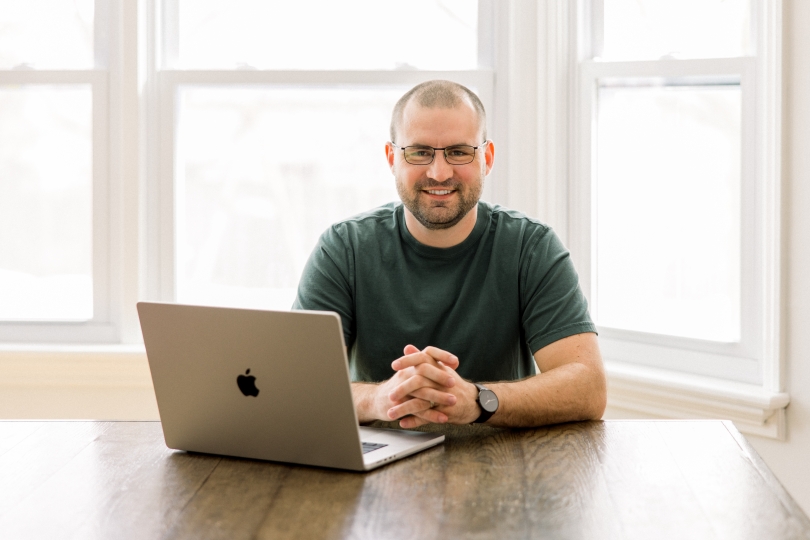Ben Cook, S.M. ’14
Artificial intelligence and computer vision are revolutionizing myriad industries, including agricultural production. Start-ups around the world are using these technologies to provide aerial imaging of livestock, monitor moisture levels in soil, and automate the removal of rocks from tillable land. John Deere, one of the biggest manufacturers of agricultural vehicles and equipment in the world, recently announced a self-driving autonomous tractor.
Ben Cook, S.M. ’14, earned his master’s degree in computational science at the Harvard John A. Paulson School of Engineering and Applied Sciences (SEAS). Now he wants to be part of the wave of AI-driven technologies in agritech. He’s pursuing that goal as an independent machine learning consultant in Omaha, right in the agricultural heartland of America.
“I’m working with cows, hogs, chickens, and utility poles,” Cook said. “A lot of it is around automation, working with robotics companies. But also, a lot of people just want to know more information about each animal, or about an overall group of animals. A lot of it is about generating data they can use for analytics to optimize their processes, be smarter about which animals they buy, and the prices they sell at.”
Cook came to Harvard with a bachelor’s degree in Spanish and sociology from Nebraska Wesleyan University, as well as a master’s degree in sociology and statistics from the University of Nebraska. He considered pursuing a Ph.D. in either sociology or statistics but was ultimately drawn to the newly created Data Science program at SEAS.
“I ultimately decided I was going to want to work in industry, and this data science field was a moving target, so I wanted to complete something as quickly as possible,” he said. “I decided Harvard would be the best fit for my goals and what I was looking for.”
The seeds of Cook’s future career first took hold while at SEAS. He founded Bit Farm through the Harvard Innovation Labs Venture Program, combining local farm data and computer algorithms to measure moisture levels and predict crop yield.
Cook’s career pivoted after SEAS, as he returned to Omaha. He continued to work in machine learning and data science, but it was with Hudl, a website that tracks statistics and videos for high school athletes across the country,
“They were much newer at the time, and I said, ‘Look, you all have a bunch of data. You should be doing sports analytics with that data, and I’d love to come help you figure it out,’” he said. “I ended up helping set up their first data warehouse. Hudl fundamentally is a sports video company, and we could see that computer vision and data science were merging around this deep learning space.”
Cook spent seven years at Hudl, starting as a data scientist in 2014 and leaving as engineering director of the Applied Machine Learning Team in 2021. Since becoming an independent consultant, he’s drawn the interest of so many businesses in and around Nebraska that he’s looking to hire additional employees. His projects have ranged from an app that collects and shares data about cattle herds to a company that uses automated thermal imaging to monitor electric utility poles.
“I work with two groups: large agribusiness and start-ups,” he said. “There are a lot of start-ups that have an entrepreneurship idea. Maybe they grew up around chickens, and they know that they need to do XYZ with chickens. Now they’re going to launch a start-up, but they need help with the machine learning piece of it.”
Along with improved production, AI can be a solution to a steep decline in available agricultural labor. The total number of farmworkers dropped from approximately 10 million in 1950 to just over 3 million in 2000. This decline has been linked to a number of factors, including an aging workforce, inefficiencies in the federal programs that allow farms to hire foreign labor, and increased education opportunities making it easier for immigrants to find work in other fields.
Computer vision and machine learning enable farms to automate certain processes, making it easier to operate with a reduced workforce.
Thanks to the education he got at SEAS, Cook is helping farms and agribusinesses modernize and survive.
“Animal production is what I’ve been focused on, and I think all those companies are in Nebraska, so people are getting excited about it,” Cook said. “These fields are definitely changing. They’ve been a little bit slower to adopt some of the newer technology than other industries, but it’s happening. "
Press Contact
Matt Goisman | mgoisman@g.harvard.edu
